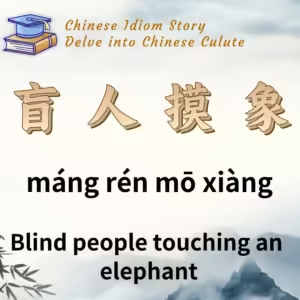
Chinese Idiom: 扑朔迷离 (Pu Shuo Mi Li)
English Translation: Hopping and squinting, hard to distinguish
pīn yīn: pū shuò mí lí
Idiom Meaning: Originally used to describe the difficulty in distinguishing between male and female, it is now commonly used to describe something that is unclear, confusing, or difficult to discern the truth of.
Historical Source: Northern Dynasty’s Yuefu poem “The Ballad of Mulan” (《木兰辞》).
Idiom Story:
“The Ballad of Mulan” is a long narrative poem that vividly tells a touching story that has been passed down in China for centuries. The poem recounts the tale of Mulan, a young woman who disguised herself as a man to take her aging father’s place in the army.
Throughout history, there has been much debate over Mulan’s surname and hometown, and even whether she actually existed. However, the story and poem are believed to have originated during the Northern Wei dynasty. Between 407 and 493 AD, the Northern Wei, a regime established by the Xianbei people in northern China, engaged in several significant wars with the Rouran nomads, who lived in what is now Inner Mongolia and Mongolia. During this period, women in these regions were skilled in archery and horseback riding. The locations mentioned in the poem, such as Black Mountain and Yan Mountain, were actual battlefields of that time, leading to the belief that the poem was created against the backdrop of these historical events.
The poem tells the complete story of Mulan, a virtuous, hardworking, and courageous young woman. One day, while she was weaving at home, an imperial decree arrived, ordering all men to join the army to defend the nation against invading forces. Mulan’s elderly father was among those called to serve. Out of love for her country and filial piety, Mulan decided to disguise herself as a man and take her father’s place in the army. During the years of hardship and battles, Mulan distinguished herself with numerous achievements, and the war eventually ended in victory. Despite her contributions, Mulan declined any official rewards, preferring to return to her peaceful life in her hometown. When she finally returned home and reunited with her family, she changed out of her military uniform and into her old clothes. The poem then describes:
“She goes out to see her comrades, and they are all amazed.
They had fought together for twelve years, yet they did not know that Mulan was a woman.”
These lines mean that when Mulan changed out of her soldier’s uniform and back into her woman’s clothes, her fellow soldiers were stunned. After spending twelve years together, none of them had realized that Mulan was a woman.
The poem concludes with the following lines:
“The male hare’s feet are hopping, the female hare’s eyes are squinting.
Two hares running side by side, how can you tell which is male or female?”
These lines mean that it’s difficult to distinguish between a male and a female hare based on their appearance alone. It’s only when they are not moving that one can tell the difference. The male hare is more active, constantly moving its feet, while the female hare is more still, often squinting its eyes when at rest. However, when they run together, it becomes challenging to tell them apart.
This metaphor from the poem beautifully captures the essence of Mulan’s story, emphasizing how appearances can be deceiving and how courage and virtue transcend gender.






